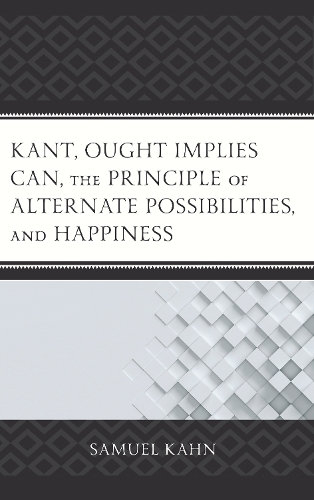
Kant, Ought Implies Can, the Principle of Alternate Possibilities, and Happiness
(Hardback)
Publishing Details
Kant, Ought Implies Can, the Principle of Alternate Possibilities, and Happiness
By (Author) Samuel Kahn
Bloomsbury Publishing PLC
Lexington Books
31st December 2018
United States
Classifications
Professional and Scholarly
Non Fiction
Ethics and moral philosophy
Philosophy: logic
193
Physical Properties
Hardback
280
Width 165mm, Height 231mm, Spine 26mm
558g
Description
Throughout his corpus, Kant repeatedly and resolutely denies that there is a duty to promote ones own happiness, and most present-day Kantians seem to agree with him. In Kant, Ought Implies Can, the Principle of Alternate Possibilities, and Happiness, Samuel Kahn argues that this denial rests on two main ideas: (1) a conception of duty that makes the principle of ought implies can (OIC) and the principle of alternate possibilities (PAP) analytic, and (2) the claim that humans necessarily promote their own happiness. This book defends OIC and PAP but nonetheless attacks the second idea, and it supplements this attack with two additional argumentsan interpersonal one and an intrapersonal onefor the claim that a modern day Kantian ethics should affirm a duty to promote ones own happiness.
Reviews
Samuel Kahns book is a wide-ranging and provocative discussion of important issues in normative ethics, metaethics and moral psychology. It contains thoughtful and cogent discussions not only of Kant and the Kant literature, but also of contemporary treatments of the moral ought, responsibility and the place of happiness among human ends. Kahn provides an engaging introduction to all these themes. -- Allen Wood, Indiana University Bloomington
Samuel Kahn explores one of the most puzzling but under-theorized aspects of Kants ethics: the nature and moral importance of human happiness. Against most readings, Kahn contends that not only was Kant wrong to insist that a person could have no moral duty to promote her own happiness, but also that his own views entail that we do. Kahn brings Kants ethics into a sustained and illuminating conversation with the extensive contemporary literature on the relationship between obligation, blameworthiness, and the possibility of fulfilling (or failing to fulfill) the demands of morality. This encyclopedic work will be a valuable resource not just for those interested in Kants practical philosophy, but for anyone concerned with the moral significance of our physical and psychological limitations. -- David Sussman, University of Illinois at Urbana-Champaign
Author Bio
Samuel Kahn is associate professor of philosophy at Wuhan University.
